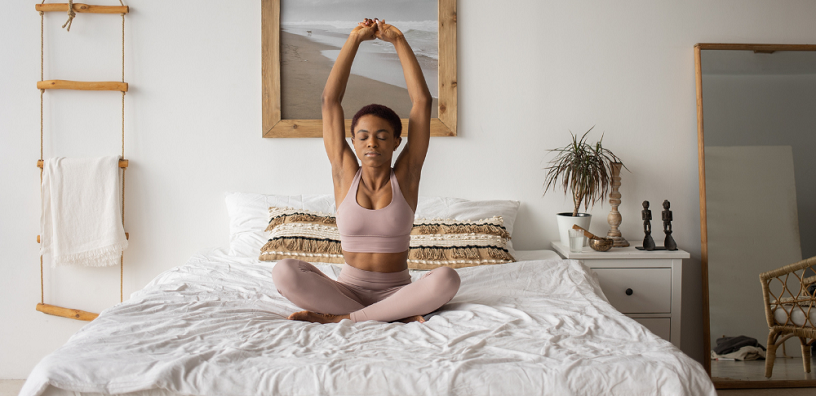
3 Easy Ways to Improve Your Mental Health
Mental health is just as important as physical health, and it's something that we should all be talking about year-round. If you're feeling stressed, anxious, or depressed, there are things you can do to improve your mental health.
Keep reading to learn 3 simple ways you can boost your brain.

Physical Health - Brain Health Connection
Eating a healthy diet, getting regular exercise, and getting enough sleep are all important for your mental health. Here’s why:
- Move around. Regular exercise has been shown to have many mental health benefits, including reducing stress, depression, and anxiety. It can also improve mood, self-esteem, and social interaction.[3,4]
- Nutrients, nutrients, nutrients. The gut-brain axis is a two-way communication system between the gut and the brain. This connection is regulated by gut microbes and neurotransmitters, which can affect mood, sleep, and appetite. [5] Eating a well-balanced diet can help to improve mental health by supporting gut health and reducing inflammation.
Some tried and true dietary recommendations specific to the gut-brain axis: [7]
- Eat plenty of fruits and vegetables. Fruits and vegetables are high in fiber, vitamins, and minerals, which are essential for good mental health.
- Choose whole grains over processed grains. Whole grains are a good source of fiber and nutrients, and they can help to improve gut health.
- Eat lean protein. Lean protein can help to maintain a healthy weight, which can also improve mental health.
- Limit unhealthy fats. Unhealthy fats, such as saturated and trans fats, can increase inflammation, which can worsen mental health symptoms.
- Avoid sugary drinks. Sugary drinks can contribute to weight gain and inflammation, which can worsen mental health symptoms.
- Limit alcohol. Alcohol can worsen mental health symptoms, especially in people with a history of mental illness.

Slow Down & Breathe
Relaxation is vital to self-care. By making some time for yourself each day to relax (even just a few minutes), you’re taking steps toward a happier and healthier you. You deserve it! Here are a few simple suggestions to help you get started:
- Meditate: Find your zen with a little me-time. Find a quiet place, get comfy, and focus on your breath.
- Progressive Relaxation: Flex and release your muscles to melt away tension. Visualize yourself in a peaceful place, or use deep breathing to help you relax.
- Guided Imagery: Picture yourself in a happy place. Use your imagination to create a relaxing scene that helps you feel calm and at peace.
- Deep Breathing: Take slow, deep breaths to clear your mind and relax your body. Focus on your breath and let go of all your worries.
Need more tips to make the most of your relaxation time? We’ve got you covered:
- Find a quiet place where you won't be interrupted.
- Set a timer for 10-15 minutes.
- Wear comfortable clothing, like the Cosy House Bamboo Loungewear Set.
- Close your eyes and focus on your breath.
- If your mind wanders, gently bring it back to your breath.
- Don't be afraid to experiment with different relaxation techniques until you find what works best for you.

Get More Snooze Time In
Sleep tight, don’t let the bed bugs bite—and don’t let insomnia take a bite out of your mental health! Most adults need 7-9 hours of sleep each night, but many of us don’t get enough. Here are some simple ways to improve your sleep:
- Invest in better sheets. Ditch your old, uncomfortable sheets and sink into these ultra-soft and smooth 1500 Series Bed Sheets instead! Our sheets are made from a premium blend of materials that are soft, breathable, and hypoallergenic. They'll keep you cool and comfortable all night long, so you can wake up feeling refreshed and ready to take on the day.
- Your bedroom is your sleep oasis. Our circadian rhythms are based on light, darkness, and the release of melatonin, so make your room dark, quiet, and cool. [2] Ditch the screens at least 30 minutes before bed. And don't forget the pillow! Get one that supports your head and neck for extra comfort.
- Be consistent. Go to bed and wake up at the same time each day, even on weekends. This will help to regulate your body's natural sleep-wake cycle.
- Don’t fight it. If you can't fall asleep after 20 minutes, get out of bed and do something relaxing until you feel tired. Lying in bed awake will only make it harder to fall asleep.
- Try a weighted blanket. Weighted blankets are a type of therapeutic blanket that can help to reduce stress and anxiety. They work by providing deep pressure stimulation, which can help to relax the nervous system. [6] Give the Luxury Weighted Blanket a try for the perfect end to a long day.
Curious to learn more about how your bedroom is affecting your mental health? Click here to read on.

A Note On Prioritizing Your Mental Health
Remember, you are not alone. Many people care about you and want to help. If you're struggling with your mental health, please reach out. You deserve to feel your best. Here are just a few resources available to you [1]:
Get Help in a Crisis:
- Call 911 if you or someone you know is in immediate danger.
- 988 Suicide & Crisis Lifeline: Call or text 988. Use Lifeline Chat on the web.
- Veterans Crisis Line: Use Veterans Crisis Chat on the web. Or call 1-800-273-8255 and press 1.
- Disaster Distress Helpline: Call or text 1-800-985-5990.
- Text “HOME” to the Crisis Text Line at 741741.
- National Alliance on Mental Illness: 1-800-950-NAMI (6264).
- MentalHealth.gov: A website of the U.S. Department of Health and Human Services that provides information and resources on mental health.
Here are some additional tips for improving your mental wellness:
- Connect with others. Spending time with friends and family can help you to feel supported and less alone.
- Get help if you need it. If you're struggling with your mental health, don't be afraid to reach out for help. There are many resources available to you, including therapists, counselors, and support groups.
- Set realistic goals. Don't put too much pressure on yourself to achieve unrealistic goals. Instead, set small, achievable goals that you can build on over time.
- Reward yourself for your accomplishments. When you reach a goal, take some time to celebrate your success. This will help you to stay motivated and on track.
- Take breaks. It's important to take breaks from time to time, even if it's just for a few minutes. Get up and move around, or do something that you enjoy.
- Don't be afraid to say no. It's okay to say no to things that you don't have time for or that you don't want to do. Learning to say no can help you to reduce stress and preserve your energy.
- Practice gratitude. Taking the time to appreciate the good things in your life can help to improve your mood and outlook.
Disclaimer
The information in this blog post is not a substitute for professional medical advice. If you are experiencing mental health problems, please seek help from a qualified mental health professional.
Searching for more goodies to help you stay cool, calm, and relaxed? Click here to find a huge selection of home essentials to make your life, and your home, that much cozier.
We've gone ahead & enclosed a 10% off coupon below for you to use if you'd like to take the plunge and try out our sheets for yourself! To shop our collection & get 10% OFF Use the code 'BLOG10' at checkout.
What are your favorite products from Cosy House? Let us know in the comments below. The Cosy community loves hearing from you.
Resources:
- U.S. Department of Health and Human Services. (n.d.). Help for mental illnesses. National Institute of Mental Health. https://www.nimh.nih.gov/health/find-help
- Better Sleep to maintain mental health. NAMI California. (2021, March 16). https://namica.org/blog/better-sleep-to-maintain-mental-health/
- U.S. National Library of Medicine. (n.d.). How to improve mental health. MedlinePlus. https://medlineplus.gov/howtoimprovementalhealth.html
- Sharma A, Madaan V, Petty FD. Exercise for mental health. Prim Care Companion J Clin Psychiatry. 2006;8(2):106. doi 10.4088/PCC.v08n0208a. PMID: 16862239; PMCID: PMC1470658.
- Snyder, C. (2022, June 29). Can your diet affect your mental health? Healthline. https://www.healthline.com/nutrition/diet-and-mental-health-can-what-you-eat-affect-how-you-feel
- Lockett, E. (2021, October 26). Weighted blankets: Benefits, do they work, and more. Healthline. Retrieved from https://www.healthline.com/health/anxiety/do-weighted-blankets-work
- Harvard Health Publishing. "The Gut-Brain Axis: How Your Gut Microbes Affect Your Mood and Mental Health." Harvard Health Publishing, Harvard Health Publishing, 2023, www.health.harvard.edu/mind-and-mood/the-gut-brain-axis-how-your-gut-microbes-affect-your-mood-and-mental-health.


